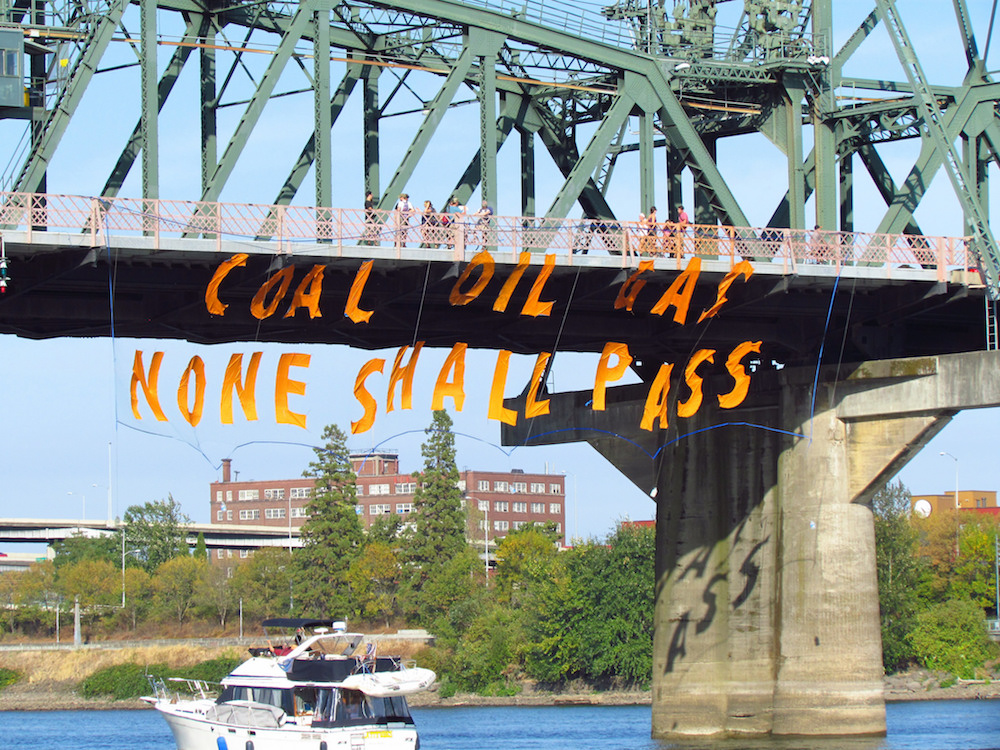In another major blow to the West Coast oil-by-rail industry, a Washington state agency voted unanimously to recommend Governor Jay Inslee reject the Vancouver Energy oil terminal. Proposed for construction in Vancouver, Washington, along the Columbia River, it would be the largest oil-by-rail facility in the country.
Washington State’s Energy Facility Site Evaluation Council (EFSEC) has been reviewing the project since 2013 — reportedly the longest review period ever for the council. However, its November 28 meeting and vote on the final recommendation for the Tesoro Savage–backed project only took 10 minutes.
“Given the reality of climate change, there is simply no reason to build new fossil fuel infrastructure, especially for the export of extreme oil,” said Matt Krogh of activist group Stand, one of many groups opposing the Vancouver Energy project. “The entire reason behind this proposal was to move crude oil from the middle of North America to overseas markets. Simply put, this oil is not for us — and the proposal would leave every single community along the rail lines with all of the risk and none of the reward.”
Vancouver Energy told Oregon Public Broadcasting that the council has “set an impossible standard” for new energy facilities in Washington.
Proposed by Tesoro Savage Petroleum Terminal LLC (also known as Vancouver Energy), the facility is designed to handle 360,000 barrels of oil per day. Expectations are that the facility would receive both the highly volatile light Bakken oil as well as Canadian tar sands oil, with much of it traveling through the Columbia River Gorge. In 2016 an oil train derailed and caught fire in Mosier, Oregon, with some of the oil ending up in the Columbia River, which has already been suffering major declines of its once-historic salmon populations.
A map of the proposed facility from its Final Environmental Impact Statement. Credit: Tesoro Savage Vancouver Energy Distribution Terminal Facility
Despite lower oil prices, U.S. imports of Canadian tar sands oil reached record levels in 2017 and are currently at 3.3 million barrels per day. More of that oil has been moving by rail recently, and as overall tar sands production continues to rise, industry observers predict large potential increases in shipping more of it by rail over the next several years.
Rich Kruger, CEO of tar sands producer Imperial (the Canadian affiliate of ExxonMobil), recently commented on how rail was becoming more attractive as a way to get oil to America.
“Rail is increasingly competitive,” Kruger told Bloomberg. “There are times when we look at the pipeline alternative, [but] the variable cost aspect of rail is a more attractive means for us to get to the mid-Western or Gulf coast markets.”
West Coast Oil-by-Rail Plans
Should Washington Governor Inslee, who has 60 days to make a final decision, follow the recommendation to reject the Vancouver Energy oil terminal, it would throw a major wrench in oil industry plans for Canadian tar sands and Bakken oil in the West. As DeSmog reported in June, oil-by-rail remains part of the industry’s long-term plans to get oil to West Coast refineries.
If Governor Inslee stops this project, it will join the growing list of oil terminals in the West rejected after intense local opposition. Earlier this month a California court ruled that an oil refinery and rail project in Bakersfield could not proceed because its environmental review was inadequate.
Earlier this year the Washington Supreme Court voted unanimously to deny an oil-by-rail project in Grays Harbor because that project lacked a comprehensive environmental review that considered the Ocean Resources Management Act.
Also in 2017, a proposed Phillips 66 oil-by-rail project in California was voted down by the San Luis Obispo County planning commission. In 2016 the city council in Benicia, California, voted unanimously to reject Valero’s proposed oil-by-rail project.
Growing awareness of the risks of oil train terminals has led many communities where they are proposed to back away from such projects.
Local Election Was Proxy Vote on Vancouver Oil Terminal
Because Vancouver Energy’s proposed oil-by-rail facility is sited in the Port of Vancouver, a recent electoral race for one of the port commission’s three seats became a proxy fight over the oil terminal.
The race was between Don Orange, owner of a local auto repair shop and opponent of the oil-by-rail project, and Kris Greene, an insurance agent who was backed by large amounts of money from oil and rail corporations. Oregon Public Broadcasting reported Greene raised “nearly $600,000, with 87 percent coming from Vancouver Energy and backers of the project” and also received support from a PAC, funded in part by rail company BNSF and Tesoro, which spent $160,000.
However, Orange also raised close to $400,000, with considerable support coming from the Washington Conservation Voters Action Fund.
Orange thought there was little question why so much money was pouring into a local election for a seat on a commission that pays around $10,000 a year.
“This is a choice of what our economy should look like,” said Orange. “It is a choice of having a vibrant small business economy or becoming a big oil town.”
The election’s results showed how the majority of the community felt about the oil-by-rail project: despite being outspent by Greene, Orange won over 64 percent of the vote.
Current port commissioner Eric LaBrant was shocked by the results, saying, “I’ve never seen anything like this in local politics … This election shows where the community wants to go and what kind of business the community wants to have there at the port.”
Still, the final decision on the oil terminal lies with the governor, and even then, the door remains open for either side to take legal action.
Main image: People’s Climate March PDX Credit: David Sierralupe, CC BY 2.0
Subscribe to our newsletter
Stay up to date with DeSmog news and alerts








